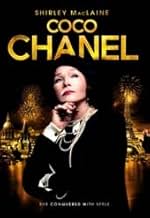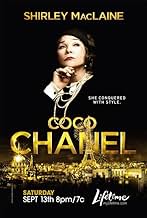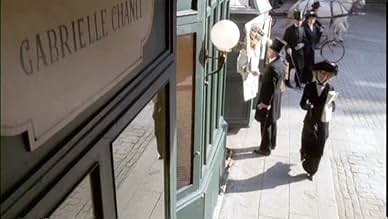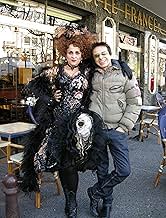Agrega una trama en tu idiomaThe life story of legendary fashion designer Coco Chanel.The life story of legendary fashion designer Coco Chanel.The life story of legendary fashion designer Coco Chanel.
- Dirección
- Guionistas
- Elenco
- Nominado a 2 premios Primetime Emmy
- 2 premios ganados y 8 nominaciones en total
Valeria Cavalli
- Elisabeth Ducrot
- (as Valéria Cavalli)
Opiniones destacadas
Yeah, I agree with the other review. Gabrielle "Coco" Chanel was a Nazi spy and an opportunist.
Lifetime's 2008 film "Coco Chanel" brings back the miniseries of the 1980s, many of which were based on novels by Judith Krantz or her ilk and starred people like Jane Seymour or Stefanie Powers. When the networks ran out of money and their viewerships dropped, they stopped making them.
Lifetime can't do the work of three networks, but it can occasionally bring us something like the entertaining "Coco Chanel" and a star like Shirley MacLaine in the lead as the older, reminiscing Chanel and Barbora Bobulova as the young Chanel.
The fascinating queen of haute couture has been the subject of a Broadway show, a movie starring Audrey Tatou, and several other films, two of which are about her relationship with Igor Stravinsky.
The film does a good job of showing Chanel's poor background, love life, and rise to fame, including her beginnings as a hat maker, the introduction of Chanel No. 5, the Chanel suit, and the little black dress, but eliminates much of probably the most fascinating period of her life, World War II.
During that time. She was arrested for war crimes but never tried due to the intervention of the Royal Family. I suppose that's a movie in itself.
Coco Chanel changed the way women dressed and also introduced a new philosophy of fashion - women should dress for themselves and not their men, and true fashion comes from the streets, or it isn't fashion. She also emphasized the use of accessories.
Chanel was a powerful woman from a humble background in a class-conscious society and depended upon alliances with the wealthy to get her where she needed to go.
In showing this, the movie does a very good job and could not have picked anyone better to play the icon than Shirley MacLaine, who does a fantastic job. One complaint I have is that, as much as I liked Barbora Bobulova, there wasn't enough of the older Chanel. MacLaine's performance really dominates the movie, even when she's not in a scene!
I also liked her suggestion of an accent rather than a full-out French accent. The French accents weren't really necessary because the characters weren't really speaking English with a French accent, they were speaking French. In that case, no accent is necessary. MacLaine gave Chanel more of a cosmopolitan accent.
All in all, a strong portrait of a fascinating woman.
Lifetime can't do the work of three networks, but it can occasionally bring us something like the entertaining "Coco Chanel" and a star like Shirley MacLaine in the lead as the older, reminiscing Chanel and Barbora Bobulova as the young Chanel.
The fascinating queen of haute couture has been the subject of a Broadway show, a movie starring Audrey Tatou, and several other films, two of which are about her relationship with Igor Stravinsky.
The film does a good job of showing Chanel's poor background, love life, and rise to fame, including her beginnings as a hat maker, the introduction of Chanel No. 5, the Chanel suit, and the little black dress, but eliminates much of probably the most fascinating period of her life, World War II.
During that time. She was arrested for war crimes but never tried due to the intervention of the Royal Family. I suppose that's a movie in itself.
Coco Chanel changed the way women dressed and also introduced a new philosophy of fashion - women should dress for themselves and not their men, and true fashion comes from the streets, or it isn't fashion. She also emphasized the use of accessories.
Chanel was a powerful woman from a humble background in a class-conscious society and depended upon alliances with the wealthy to get her where she needed to go.
In showing this, the movie does a very good job and could not have picked anyone better to play the icon than Shirley MacLaine, who does a fantastic job. One complaint I have is that, as much as I liked Barbora Bobulova, there wasn't enough of the older Chanel. MacLaine's performance really dominates the movie, even when she's not in a scene!
I also liked her suggestion of an accent rather than a full-out French accent. The French accents weren't really necessary because the characters weren't really speaking English with a French accent, they were speaking French. In that case, no accent is necessary. MacLaine gave Chanel more of a cosmopolitan accent.
All in all, a strong portrait of a fascinating woman.
A biographic film basically loyal to the true history of the pioneering French fashion designer who created the word " Haute Couture" and spread the spiritual Chanel Numero 5 to the whole world is bound to be arresting to movie lovers no matter they are fond of pursuing vogue in beau monde. And the truth is that it's inspiring and engaging. For one thing, Coco Chanel gave women a sense of freedom; gave them back their bodies that were drenched in sweat due to fashion's finery, lace, corsets, underclothes and padding. For another, she insists on woman's independence which may be achieved via true career. Also the two actresses gave the excellent rendition of this legendary woman.
Shirley Maclaine is wonderful as the late older version of Coco Chanel who sets out again to prove her art as one of the finest fashion designers of ladies' fashions and perfume in the world. Barbara Borovona is also wonderful as the younger version of Coco Chanel who rises despite tragedy, hardship, and success. In this film, there are flashbacks and wonderfully done to show Coco's rise from a seamstress assistant to her own visionary. Malcolm McDowell (he deserves knighthood or something) is fine as Coco's business partner. I don't recall the names of the other cast members but they were all fine. I could see why Coco Chanel succeeded even in a male dominated business field at the time of ladies' fashion. Coco understood women being one herself and how clothes should be expressed and comfortable as well. It should be the men who get to be comfortable, women should be too.
COCO CHANEL is a well-made film whose few flaws unfortunately detract from the enjoyment of what seems to be a rather firm biography of one of the great inventive minds of the 20th century. Though all publicity (and nominations for awards) focused on Shirley MacLaine who appears only periodically and for very brief amounts of time, the starts of the cast are a number of European actors, some strong, others, only medium strong. And while the real contribution Coco Chanel made to the world was her instatement of the equality of women, changing the manner in which they dressed (read fashionable) from corseted and plumaged mannequins to comfortably mobile and real personas, the writers of this version her life (Carla Giulia Casalini and James Carrington) elected to stress the women whose ability to adjust to being repeatedly deserted/used by men and turn this movie into a romance decorated by fashion. And even that idea, valid though it may be, is fairly well buried by a musical score that is so loud as to cover the dialogue - and the dialogue is in some nearly indecipherable language, a mixture of accents and lack of projection on the part of the actors who play more to the sets and costumes than to the audience.
Christian Duguay directs, electing to begin his story with the unhappy childhood of Gabrielle/Coco and Adrienne Chanel, orphans laced in a Catholic sweatshop to make clothes. These episodes of childhood to old age are well transitioned by a black and white, old movie film transfer that does add to the feeling of history. The girls grow into young women, Coco (Barbora Bobulova) goes to live with Etienne Balsan (Sagamore Stévenin), falls in love, faces the fact that her time with Etienne will be transitory, moves on to Paris where she struggles to make a living making hats until Boy Capel (Olivier Sitruk) becomes her benefactor and lover. But Boy leaves for the Front as a soldier for the French army, leaving Coco in Deauville to set up shop with the aid of her sister Adrienne (Valentina Lodovin). The back and forth aspects of the story show Coco in the 1950s (as Shirley MacLaine) making her comeback with the aid of her faithful manager Marc Bouchier (Malcolm MacDowell) and the film ends in a standing ovation for the woman who not only survived but who changed the world of fashion and feminism forever.
There are many other characters in the film who play important parts but they all look alike and have such heavy accents that keeping track of them is almost impossible. No subtitles are supplied: subtitles would enhance this film immeasurably! Fabrizio Lucci does wonders with the cinematic adaptation of the times frames of the piece, but composer Andrea Guerra (in a slushy replay of Tchaikovsky symphony themes) buries the lines of the actors and nearly destroys what is in essence a very good film.
Grady Harp
Christian Duguay directs, electing to begin his story with the unhappy childhood of Gabrielle/Coco and Adrienne Chanel, orphans laced in a Catholic sweatshop to make clothes. These episodes of childhood to old age are well transitioned by a black and white, old movie film transfer that does add to the feeling of history. The girls grow into young women, Coco (Barbora Bobulova) goes to live with Etienne Balsan (Sagamore Stévenin), falls in love, faces the fact that her time with Etienne will be transitory, moves on to Paris where she struggles to make a living making hats until Boy Capel (Olivier Sitruk) becomes her benefactor and lover. But Boy leaves for the Front as a soldier for the French army, leaving Coco in Deauville to set up shop with the aid of her sister Adrienne (Valentina Lodovin). The back and forth aspects of the story show Coco in the 1950s (as Shirley MacLaine) making her comeback with the aid of her faithful manager Marc Bouchier (Malcolm MacDowell) and the film ends in a standing ovation for the woman who not only survived but who changed the world of fashion and feminism forever.
There are many other characters in the film who play important parts but they all look alike and have such heavy accents that keeping track of them is almost impossible. No subtitles are supplied: subtitles would enhance this film immeasurably! Fabrizio Lucci does wonders with the cinematic adaptation of the times frames of the piece, but composer Andrea Guerra (in a slushy replay of Tchaikovsky symphony themes) buries the lines of the actors and nearly destroys what is in essence a very good film.
Grady Harp
¿Sabías que…?
- TriviaDaria Baykalova's debut.
- ErroresIn Deauville, the newspaper headline announcing the outbreak of the war incorrectly states, "Archduke Francis Joseph" had been assassinated in Sarajevo. Francis (Franz) Joseph was the reigning Austrian emperor and was most certainly not assassinated. His nephew and heir to the empire, Francis (Franz) Ferdinand was assassinated.
- ConexionesFeatured in 15th Annual Screen Actors Guild Awards (2009)
Selecciones populares
Inicia sesión para calificar y agrega a la lista de videos para obtener recomendaciones personalizadas
Detalles
Contribuir a esta página
Sugiere una edición o agrega el contenido que falta
































